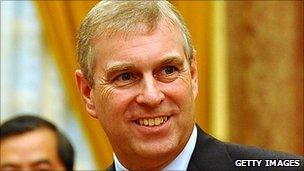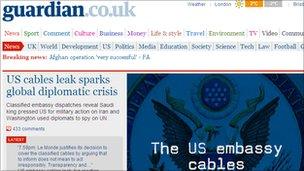Wikileaks files: US ambassador criticised Prince Andrew
- Published

Prince Andrew is the UK's special representative for trade and investment
A US ambassador wrote in a secret cable that the Duke of York spoke "cockily" during an official engagement, leading a discussion that "verged on the rude".
The remarks by Tatiana Gfoeller, Washington's ambassador to Kyrgyzstan, are revealed by the website Wikileaks.
She said Prince Andrew, a UK special representative on trade, criticised the Serious Fraud Office probe of an arms deal between BAE and Saudi Arabia.
Buckingham Palace has not responded to the reports about the prince.
In the cable, written in October 2008 and published on the Guardian newspaper's website, , externalMs Gfoeller recounts details of a brunch in the Kyrgyz capital Bishkek with British and Canadian business people.
Summing the event up, she writes: "Astonishingly candid, the discussion at times verged on the rude (from the British side)."
Under the sub-heading "Rude language a la British", she wrote that "[Prince Andrew] railed at British anti-corruption investigators, who had had the 'idiocy' of almost scuttling the Al-Yamama deal with Saudi Arabia".
She said the prince also criticised Guardian journalists - "who poke their noses everywhere" - for investigating the deal.
Ms Gfoeller said Prince Andrew told her that the UK, Western Europe and the US were now "back in the thick of playing the Great Game" - a reference to the 19th Century struggle between the British and Russian Empires for control of Central Asia.

The Guardian has defended its decision to publish leaked material
"More animated than ever, he stated cockily 'and this time we aim to win'," she wrote.
Those at the meeting were discussing potential investment in Kyrgyzstan, but the ambassador reported that Prince Andrew used the comments of one of the participants to criticise France.
She wrote: "Emboldened, one businessman said that doing business here is 'like doing business in the Yukon' in the 19th Century, i.e. only those willing to participate in local corrupt practices are able to make any money...
"At this point the Duke of York laughed uproariously, saying that: 'All of this sounds exactly like France.'"
Former foreign secretary Sir Malcolm Rifkind said the prince's comments were "unwise" but he added: "Anyone who is in public life in the modern world has to take into account that even remarks they make in a private context may end up on the public table. It was very unwise remarks to make."
He told BBC Radio 4's Today programme: "He's always been known to be a blunt speaker, that doesn't actually surprise anyone. Let's hope that he learns from this experience."
Labour MP John Mann told BBC2's Newsnight: "If these comments by Prince Andrew are accurate - and of course we don't know that yet - then clearly it's of public interest that they are out there, so that he can judge whether he is performing the role well and government can make that judgement as well.
"Prince Andrew will need to think through if he is actually carrying out this role to the best of his abilities."
The Guardian has defended its publication of information from Wikileaks, but the Foreign Office has said that it puts national security at risk.
Despite this, the Foreign Office insisted its relations with Washington would not be damaged and the US ambassador in London, Louis Susman, said he was confident the relationship would remain close.